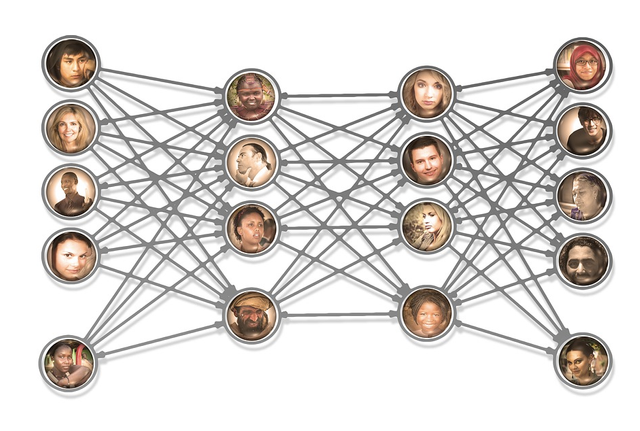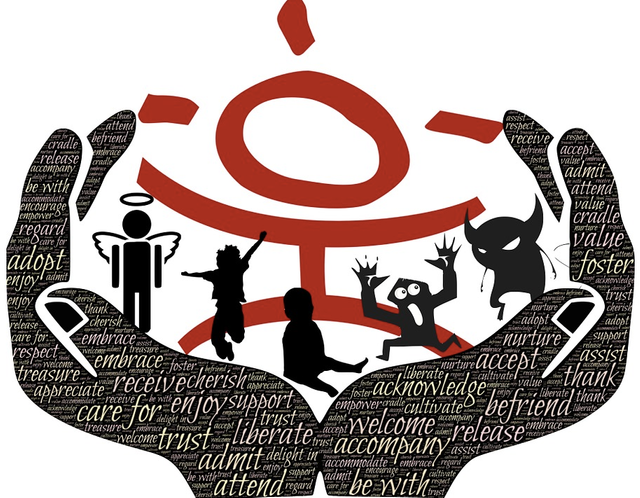The 7 Design Principles of a Blockchain Economy
New to the concepts of blockchain? Join the crowd. Earlier this week, I started reading Don and Alex Tapscott's Blockchain Revolution. I'm breaking down what I read into the simplest possible terms, in hopes that someone as clueless as I am might walk away with a slightly better understanding of this potentially revolutionary technology.
In the first entry, we focused on the basics of what makes blockchain, blockchain. Today, we're on chapter two, which focuses on the seven design principles of an economy based on the technology.
1. Networked Integrity
The basic principle: Because the blockchain is spread out over thousands of computers, it is "networked", and the participants in a blockchain economy are incentivized to maintain "integrity", as every interaction is indelibly recorded.
The problem solved: The less-principled members of society can try and steal money in lots of ways, the most notable being the double-spend problem. In essence, this is when someone tries to use the same virtual dollar twice at the same time.
The real issue is that we all rely on third-parties to process transactions on the Internet (banks, credits cards, etc), and the costs associated with this add up.
Breakthrough: By having networked integrity that relies on consensus to clear transactions (through things called Proof of Work or Proof of Stake, which I'll get to in another post), we no longer need these intermediaries.
Implications: From Tapscott: "For the first time ever, we have a platform that ensures trust in transactions, and...recorded information no matter how the other party acts."
The sniff test (my initial thoughts): This all makes sense. It's all about aligning incentives. If everyone knows your history, and you're aware that your actions won't be forgotten, you have strong incentive to behave appropriately. It's really no different at all from how we acted (as humans) when we lived in tribes.
2. Distributed Power
The basic principle: No one person or organization has outsized control over the whole, or access to an outsized amount of data.
The problem solved: The authors spend most of their ink talking about the collection of data by companies like Google, Facebook, Amazon, Apple, and the like. Whether customers know it or not, this data is virtual gold. Advertisers are willing to pay billions for that data, because it allows for uber-targeted ads to meet the juuuust right Internet user.
The two problems with this: our data is being monetized and we aren't getting equal benefits for it, and any type of breach of said data exposes us to major problems.
Breakthrough: Bootstrapping. That's the word for the process of "mining" or maintaining the network. In effect, Bitcoin worked because users all over the world were willing to use their extra computing power (like on their laptop) to either (1) mine new bitcoins, or (2) download the blockchain for bitcoin, ensuring another failsafe.
Implications: In essence, governments would have less ability to freeze or seize assets, but the authors focused on how this could create new wealth via mining.
The sniff test (my initial thoughts): The first three parts are fine, but in terms of implications, what was offered was weak. The bottom line: power is distributed by design. But if you really think that someone couldn't figure out how to leverage some type of exploitive power in the real (non-virtual) world to get outsized power, I'd call you pretty naive.
3. Value as Incentive
The Basic Principle: All stakeholders have aligned incentives. You can both (1) work for your own selfish interests, but that will (2) benefit the whole.
The problem solved: Just look at the banking crisis--while many of us think those that kept peddling subprime loans were greedier than the average citizen, the fact is that most of us would have done the exact same thing given the incentive structure that was in place at banks.
The breakthrough: The real difference is that reputation matters. That's true in the real world as well. But in the virtual, blockchain economy, it would likely be less concentrated on star-power (how many CEOs walked away with billion dollar bonuses and no consequences). Also, given the way blockchain technology works, criminals would (hypothetically) have to expend way too much time and energy to steal money than it would be worth.
Implications: In essence, the most hard-core adherents to the status quo would argue that this is how the American economy is already designed. But you can't underscore the importance of a decentralized monetary system that rewards the collective when participants act in their own best interests.
The sniff test: Like I said, this sounds pretty similar to business-as-usual for capitalism, but the decentralized nature of creating value as an incentive is important.
4. Security
The Basic Principle: Because of the distributed nature of blockchain technology, there's no central point of failure, and reckless behavior on the part of one person (sharing a password) is limited to damage for that person.
The problem solved: Whoa! This list could go on and on and on. A stolen identity? Credit-card breaches at major retailers? This shouldn't take too much imagination to understand.
The breakthrough: The public key infrastructure (PKI). I'm too stupid to understand the ins and outs of this, but basically, it works like a safe deposit box with two keys, one to encode, one to decode. As long as you aren't a dumbass and share a password (PKI) with someone else, you should be safe.
Implications: Do I really need to explain the implications for this? It would be a massive game-changer.
The sniff test: Look, I'm not stupid enough to think there's ever a 100% fool-proof way to secure information. That's because the smartest and greediest minds out there will always be looking for ways to game the system. That being said, my simple mind can appreciate the step up in security that this technology presents.
5. Privacy
The Basic Principle: People get to be in complete control of their data.
The problem solved: Just about every technology company out there collects and mines data, and is able to monetize it. When that data is breached--or when the government coerces these companies to turn over their data--your privacy is compromised.
The breakthrough: In the case of bitcoin, no real-world identity was needed to register. That's not necessarily the same on Steemit, as you have to have a Facebook or Reddit account to register. Obviously, that's pretty easy to work around though.
Implications: As the authors put it, if you have complete control over your Second Life (virtual life) privacy, it would be a big deal.
The sniff test: To me, this is the big fallacy. In general, when I try and think about what types of structure and rights are naturally endowed to us humans, I look at how we evolved. We've spent about 99% of our time living in tribes. While we did have complete freedom to do as we pleased back then (at the risk of losing the support of our tribe, of course), I don't think the same type of "privacy" the authors imagine was ever there.
When a blockchain maintains an indelible record of basically everything, it seems to me that privacy goes out the window. But maybe that's just me...
6. Rights preserved
The Basic Principle: Rights and freedoms are clear and enforceable, as they become part of the blockchain.
The problem solved: There are lots of problems. Here in the U.S., many people have trouble enforcing intellectual property rights, or dealing with anonymous defamation. Abroad, property and civil rights can be readily trampled upon.
The breakthrough: Smart contracts, which basically allow for transactions to proceed only when predefined benchmarks have been reached and agreed upon by all parties.
Implications: This is a big one that will require more reading on my part. But basically, as soon as someone loses the ability to use a work of any type (via a smart contract agreement), then the owner of that work would be able to enforce his/her own rights.
The sniff test: I want to read a lot more about smart contracts. This might be one of the linchpins of a blockchain economy that has the ability to creating a tipping point for critical mass.
7. Inclusion
The Basic Principle: Everyone in the world should have the ability to participate in the global blockchain economy.
The problem solved: There are reportedly over 2 billion people worldwide that don't have access to even a bank account.
The breakthrough: Simplified payment verification (SPV) used in bitcoin made it so that even a flip phone could function as a conduit for funds.
Implications: This is a huge deal, and makes it far easier for the world's poorest to become players in the global economy.
The sniff test: This is probably the most impactful part of a blockchain economy, should it come to fruition. It is a major cause for hope.
Many thanks to @shadowspub for linking back to my first piece. Feel free to comment below on how I've butchered some part of this. It'll only end up making us all smarter and stronger.





Hi @antifragile, just stopping by to let you know that this post was one of my favourite reads yesterday. You can read my comments about it here. Keep up the good work
Well written, but there are couple of subtleties that you missed that are important.
This one's really about being able to nearly instantly, and independently verify that someone isn't trying to give you money they've already spent. It doesn't actually record anyone who tries, because that transaction won't be included in the log.
This one's really more about distributing points of failure. If you attack any one person in the blockchain, you only gain access to their funds, as opposed to hacking a bank, and gaining access to everybody's funds. And where a bank has the power to just move money around however they want in the accounts they control, you couldn't do this on the blockchain without convincing everyone that the moves were legitimate (near impossible).
You actually did catch this one. It has been shown that it's not super difficult to figure out real identities based on data in the blockchain. There are some other crypto-currencies working on this problem, but it is a very tricky one.
Anyway, just a few things I thought were worth pointing out. Good article overall.
@logicalliberty- Many thanks for the feedback!
This post has been linked to from another place on Steem.
Learn more about linkback bot v0.4. Upvote if you want the bot to continue posting linkbacks for your posts. Flag if otherwise.
Built by @ontofractal
This is a very good write up and considerations have been given to very core aspects of what makes a good Blockchain company or project. Would you be willing to discuss this article with us on a video conversation by any chance? We are running a Blockchain community on Facebook and we would love to chat to you on a live stream interview on there.
my favorite part is security and privacy.
This is still relevant, these kinds of articles build on Steemit's value in the long run.
It's indeed useful, and I'm pretty sure that since cryptocurrencies are getting pretty popular, more people will get into this field. Nowadays, people are getting into crypto projects, and I think it's actually a good idea since you can profit a lot. I'm planning to work with another launchpad maiar , and I know that it has a high potential, so I don't think I'll regret it.